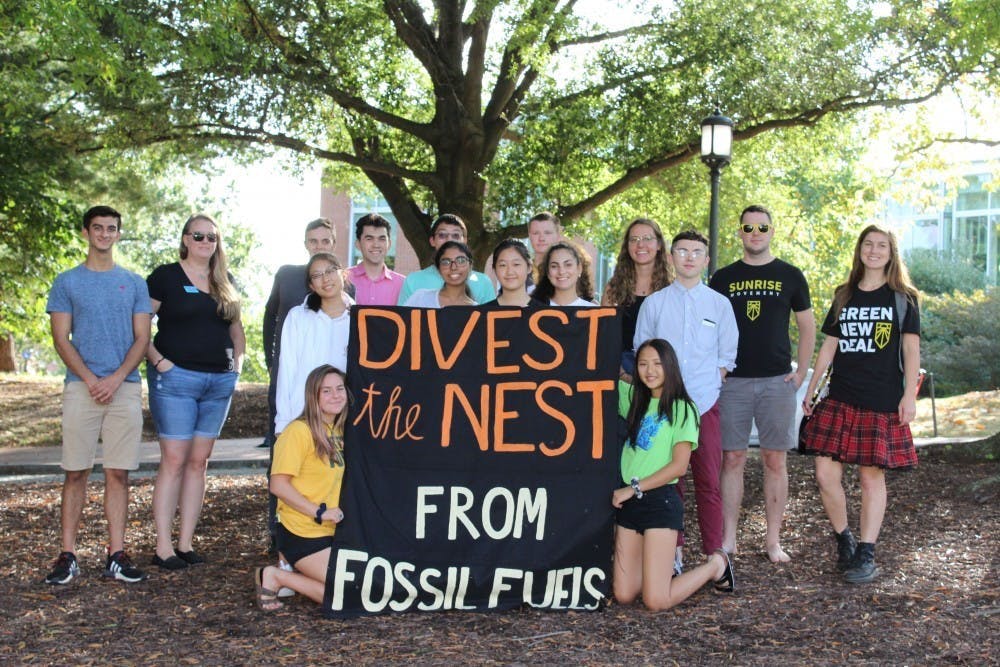Refuel Our Future, the University’s student-run divestment organization, is starting Fossil Free Fridays, a weekly strike on Fridays going off of the national Fridays For Future (FFF) climate strike movement. Instead of protesting for climate justice and a Green New Deal, which is the basis of the fight for the youth FFF movement, Refuel will protest for fossil fuel divestment, a fight that the organization has been trying to win for a few years.
Students want divestment from fossil fuels. Divestment means that Hopkins will no longer depend on fossil fuels in any way and will no longer invest in those companies as part of their endowment. The University’s endowment, which is worth $4.33 billion, allows the University to give scholarships and financial aid to their students. If it is steadily growing, it can help reduce annual tuition, which many people depend on in order to attend the University.
Hopkins currently invests in fossil fuel companies. It has already divested from fossil fuel companies with 35 percent or more of their total production in thermal coal, which Univerisity President Ronald J. Daniels said “poses a unique threat to public health and to the environment” in December 2017. However, there are still two other sources of fossil fuels that we are investing in as an institution: oil and natural gas. Both pose a large threat to the global climate crisis and to the emission of carbon dioxide, increasing greenhouse gas emissions overall.
Not only does fossil fuel divestment help decrease our support towards fossil fuel companies, it also is now more financially risky to invest than to divest. According to “The Financial Case for Fossil Fuel Divestment” from the Institute for Energy Economics and Financial Analysis, “the risks suggest that the investment thesis advanced by the coal, oil and gas sector that worked for decades has lost its validity.... [F]or individual and institutional investors it is time to reconsider investments in the fossil fuel industry.” Hopkins is only risking its financial stability by continuing to invest in oil and natural gas.
This industry will no longer lead institutions to have a steady and stable profit growth. There is increasing awareness about fossil fuels’ impact on climate change and an increase in electric car purchases. The world overall is switching to a less energy-dependent way of life. Divestment campaigns are also growing and having more wins now than ever.
Fossil fuel companies are trying to stick with the world’s changing viewpoints, but it just isn’t going to happen. Hopkins needs to keep up with the world, too. Eventually, oil and natural gas reserves will run out: What will we do then?
There are also many sources stating that renewables are the most rapidly growing sources of energy in the U.S. for at least the next couple of years. According to a summary by Renewable Energy World of the Energy Infrastructure Update published in July by the Federal Energy Regulatory Commission, there could be “effectively no growth in the generating capacity of fossil fuels... and a net decline of 7 gigawatts (GW).... Meanwhile, led by wind and solar, the generating capacity of renewable energy sources is foreseen to grow by more than 45 GW.” Essentially, continuing to invest is financially risky due to the instability of the fossil fuel industry and their projected growth. If those markets are not doing well, then Hopkins does not benefit from them. The institution is harming its own financial stability.
There are some arguments against Hopkins divesting. It may lead to a drop in the number of transfer students. It really has no financial or environmental benefits. It will lead to “increased annual tuition rates, scholarship losses and reductions in faculty spending,” according to an article from The Baltimore Sun in January 2018.
However, doesn’t it make sense not to invest in the top cause that increases carbon emissions worldwide? Could divestment lead other institutions to do the same (since Hopkins has one of the largest endowments in the country)? Divestment could even lead to a decrease in oil and natural gas drilling practices overall — who knows; it’s definitely worth a shot.
In order to succeed in divesting from the rest of fossil fuels, Refuel decided to start Fossil Free Fridays and to push out a petition to accumulate student support for divestment. This follows divestment clubs at Cornell University and the University of Pennsylvania who both started these weekly strikes in the last two months.
Every Friday, members of Refuel and anyone else who wishes to participate will sit on the Gilman steps with the Refuel Our Future banner and some posters. The club will give out information to students about what divestment is, why it needs to be done and how they can help.
The first strike will be next Friday, Nov. 15. Students are encouraged to wear orange, the national color for divestment. Please show up and help us fight for divestment — we don’t need fossil fuels, and the world doesn’t either.
Lais Santoro is a freshman from Downingtown, Pennsylvania studying Public Health and Environmental Science. She is involved in Refuel our Future and other organizations in the JHU Sustainability Coalition.





